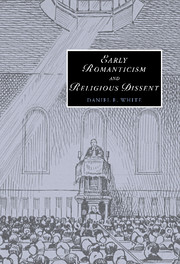Book contents
- Frontmatter
- Contents
- List of illustrations
- Acknowledgments
- Frequently cited texts
- Epigraph
- Introduction
- 1 “True Principles of Religion and Liberty”: liberal Dissent and the Warrington Academy
- 2 Anna Barbauld and devotional tastes: extempore, particular, experimental
- 3 The “Joineriana”: Barbauld, the Aikin family circle, and the Dissenting public sphere
- 4 Godwinian scenes and popular politics: Godwin, Wollstonecraft, and the legacies of Dissent
- 5 “Properer for a Sermon”: Coleridgean ministries
- 6 “A Saracenic mosque, not a Quaker meeting-house”: Southey's Thalaba, Islam, and religious nonconformity
- 7 Conclusion
- Notes
- Bibliography
- Index
- CAMBRIDGE STUDIES IN ROMANTICISM
1 - “True Principles of Religion and Liberty”: liberal Dissent and the Warrington Academy
Published online by Cambridge University Press: 22 September 2009
- Frontmatter
- Contents
- List of illustrations
- Acknowledgments
- Frequently cited texts
- Epigraph
- Introduction
- 1 “True Principles of Religion and Liberty”: liberal Dissent and the Warrington Academy
- 2 Anna Barbauld and devotional tastes: extempore, particular, experimental
- 3 The “Joineriana”: Barbauld, the Aikin family circle, and the Dissenting public sphere
- 4 Godwinian scenes and popular politics: Godwin, Wollstonecraft, and the legacies of Dissent
- 5 “Properer for a Sermon”: Coleridgean ministries
- 6 “A Saracenic mosque, not a Quaker meeting-house”: Southey's Thalaba, Islam, and religious nonconformity
- 7 Conclusion
- Notes
- Bibliography
- Index
- CAMBRIDGE STUDIES IN ROMANTICISM
Summary
From the subsiding of the Jacobite threat after 1745 to the movement to repeal the Corporation and Test Acts at the onset of the French Revolution, a network of Dissenting educators and writers publicly associated the religious, political, and economic features of their nonconformity with deeply nationalistic definitions of British liberty. In a memorable assessment of the early eighteenth century by G. M. Trevelyan, “While religion divided, trade united the nation, and trade was gaining in relative importance. The Bible had now a rival in the ledger. The Puritan, sixty years back, had been Cromwell, sword in hand; thirty years back, Bunyan, singing hymns in gaol; but now the Puritan was to be found in the tradesman-journalist Defoe.” It is frequently asserted that by the late eighteenth century Dissenters dominated commercial life. Isaac Kramnick writes that although Dissenters “made up 7% of the population (90% were Anglican) these nonconformists contributed some 41% of the important entrepreneurs between 1760 and 1830.” Although it seems unlikely that Dissenters did in fact account for such a vastly disproportionate number of leading entrepreneurs and inventors, they nonetheless accurately saw and represented themselves as publicly dedicated to promoting religion, liberty, and trade, and their educational institutions followed suit. After Defoe, and especially after the growth of the Dissenting academies in the 1740s and '50s, the Bible and the ledger, the Christian and the tradesman, ceased to be rivals and indeed seemed to cooperate in realizing a progressive vision of Protestant and national history.
- Type
- Chapter
- Information
- Early Romanticism and Religious Dissent , pp. 17 - 33Publisher: Cambridge University PressPrint publication year: 2007



